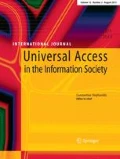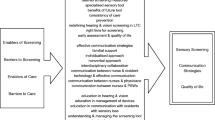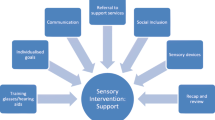Abstract
The aim of this paper is to identify and discuss some of the effects that a person’s sensory impairment has on the ways in which they can participate in research. Sensory impairment will result in a person receiving less sensory information. This reduction may be uniform across a particular type of sensory information (like having the volume on the radio turned down or watching things through a haze) or, more likely, it will have different effects on different parts of the available information. The result of this information loss will not be that the person has a partial experience of a situation compared to a person without a sensory impairment or with a different sensory impairment. Instead, they will have a full experience based on a different combination of information, and it is likely that more of the information that they are using will come from their memory or previous experience. This paper describes ways of working that acknowledge the different experiences of people with a hearing or visual impairment with respect to both the object of the research and the research process. It describes how to design questionnaire, use interviews and focus groups and carry out evaluations of objects and situations in a way that acknowledges the effect of the different amounts and types of information available have on the experiences of people with sensory impairments.
Similar content being viewed by others
References
Altmann, G.T.M.: The accent of babel, an exploration of language, mind and understanding, p. 122. Oxford University Press, Oxford (1997)
Barnes, C.: ‘Emancipatory’ disability research: project or process?, p. 11. Public Lecture at City Chambers Glasgow 24 October 2001
Booth, S.A., Faconti, G., Massink, M., Bordegoni, M., De Angelis, F., May, J.: Intersensory disambiguation of shape perception with virtual visuo-haptic stimuli. In: Proceedings of the Haptic Human–Computer Interaction Workshop, p. 76–77. Glasgow University (2000)
Bruce, I., McKennell, A., Walker, E.: Blind and partially sighted adults in Britain: the RNIB survey, Vol. 1, HMSO (1991)
Consumers in NHS Research Support Unit, Involving Consumers in Research and Development in the NHS: Briefing Notes for Researchers, The Help for Health Trust (2000)
Day, C.: Consensus design: socially inclusive process. Architectural Press (2003)
European Assembly Recommendation 1592 (2003) Towards full social inclusion of people with disabilities Retrieved June 19 2003 from http://www.assembly.coe.int/Documents/AdoptedText/ta03/EREC1592.html
EUSTAT- Empowering USers Through Assistive Technology, Retrieved July 8, 2003 from http://www.siva.it/research/eustat/
Gladstone, K., Rundle, C., King, S.: New perspectives on accessible information for visually impaired people. In: Constantine Stephanidis (eds.) 10th International Conference on Human–Computer Interaction, Crete, p. 727. June 2003, Published in UNIVERSAL ACCESS IN HCI: Inclusive Design in the Information Society, Vol. 4 (2003)
Hoffman, D.: Visual Intelligence, pp. 47–77.W.W. Norton and Co, New York (1998)
Nicolle, C.: Inclusive design guidelines for HCI. Taylor & Francis, London (2001)
Styles, E.A.: The psychology of attention, p. 126. Psychology Press, Hove (1997)
Truman, C., Mertens, D.M., Humphries, B. (eds): Research and inequality, p. 5. UCL Press, London (2000)
Author information
Authors and Affiliations
Corresponding author
Rights and permissions
About this article
Cite this article
Whitney, G. Enabling people with sensory impairments to participate effectively in research. Univ Access Inf Soc 5, 287–291 (2006). https://doi.org/10.1007/s10209-006-0052-x
Published:
Issue Date:
DOI: https://doi.org/10.1007/s10209-006-0052-x




